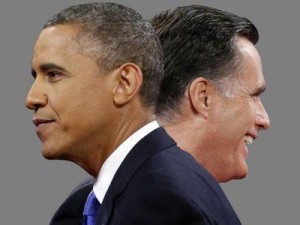Although Romney previously supported access to abortions, he now favors limiting it. He advocates for reversing Roe v. Wade, the Supreme Court ruling that established abortion rights, which would allow states to start banning abortion. He also supports ending all federal aid to Planned Parenthood, and has criticized the health law's mandatory coverage as a threat to religious liberty.
Keep in mind that there will likely be at least one U.S. Supreme Court justice who 's going to retire in the next four years, meaning that whoever becomes president may very well get the chance to appoint a new justice in line with his own political views - and that appointee could well tip the balance if another legal challenge to abortion laws comes up.
For more on abortion ...
2. Immigration
Obama has pushed for a path to citizenship for scores of young illegal immigrants. But efforts to pass the DREAM Act, as it's known, have repeatedly failed. This June, Obama delayed deportations for thousands of young illegal immigrants who are currently or recently have been students. The order allowed them to apply for two year work permits.
Romney says he will veto the DREAM Act if it ever passes in Congress. He has said, however, that he would honor the two year work permits obtained under Obama's new policy. He promises to put a comprehensive immigration policy in place before the permits expire, and advocates for completing a steel fence along the Mexican border. He also opposes allowing undocumented students to pay in-state tuition at public universities.
For more on immigration ...
3. Higher Education
Obama advocates for college to be more accessible. He successfully pushed for a $10,000 college tax credit over four years, as well as increases in Pell grants and other financial aid.
Romney argues that increases in federal student aid lead to higher tuition rates, and advocates for private lenders to be involved in the federal student loan program.
For more on education ....
4. Health Care
Obama's health care law will extend coverage to 30 million uninsured Americans and generally preserve Medicare and Medicaid.
Romney promises to repeal the health care law and move toward privatizing Medicare. He's advocated for turning over Medicaid to the states.
For more on health care ...
5. Civil Rights
Obama and his attorney general have fairly aggressively prosecuted cases of discrimination against blacks and Hispanics, including alleged discriminatory lending practices by banks and state voter identification laws that would keep a disproportionate percentage of minorities from voting.
Romney opposes many of the administration's legal actions, and has indicated that the Justice Department should steer clear of such issues.He also also expressed support for voter ID laws as an effective method of preventing voter fraud.
For more on civil rights ...
6. Gay Marriage
Obama supports legal recognition of same-sex marriage, and says it should be left up to states to decide. He's also spoken out against the Defense of Marriage Act, which prevents federal recognition of same-sex marriages, and his administration has stopped defending the law in court.
Romney advocates for a constitutional amendment banning same-sex marriage and is opposed to leaving it up to states to decide. He also opposes civil unions if they are equivalent in legal status to marriage.
For more on gay marriage ...
7. Climate Change
Since 2009, when Obama's proposed cap-and-trade bill failed to pass through Congress, his administration has taken moderate steps to reduce carbon emissions by treating it as a pollutant under the law. He has doubled auto fuel economy standards and allotted billions of stimulus dollars to investments in clean energy.
Romney's view of climate change has changed. On the campaign trail last year he said: "We don't know what's causing climate change on this planet." He's also attacked Obama's environmental regulation of coal power plants. He opposes treating carbon dioxide as a pollutant and is against cap-and-trade programs. And while he does support making some investments in clean technology, he also warns that actions to curb emissions can be detrimental to a struggling economy.
